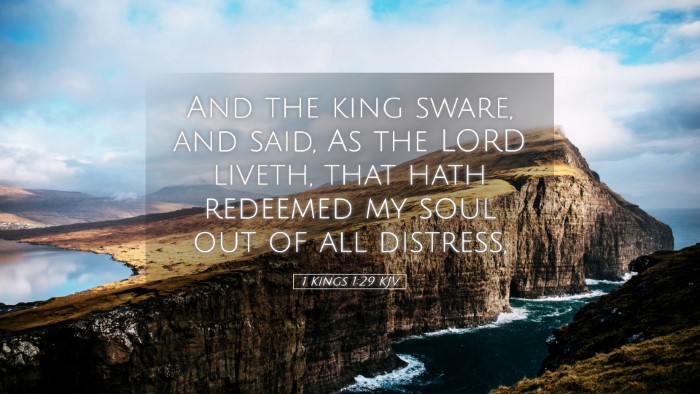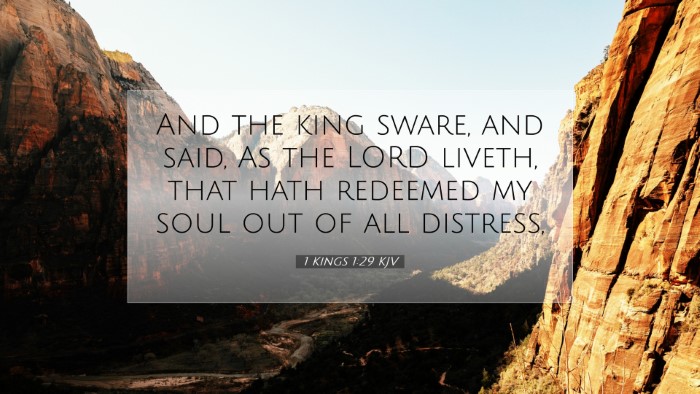Commentary on 1 Kings 1:29
Verse Context: 1 Kings 1:29 states, "And the king sware, and said, As the LORD liveth, that hath redeemed my soul out of all distress."
This verse is situated within a critical moment in the narrative of 1 Kings, where David, the aging king of Israel, is surrounded by the political intrigue concerning the succession to his throne. Understanding this context is essential for grasping the full theological and practical implications of David's oath here.
Theological Significance
The oath taken by King David invokes the name of the LORD, emphasizing the sacredness of his declaration. This act reveals David's deep faith and reliance on God as the ultimate redeemer of his soul. The language used here is not merely for solemnity but signifies the gravity of his position as both a king and a believer in the covenant promises of God.
Matthew Henry notes that David's reference to the Lord's living presence emphasizes that God is not a distant deity; He is actively involved in the affairs of humanity. David’s declaration serves as an assurance that despite the chaos surrounding him, God remains sovereign and faithful to His promises.
Historical Context
Albert Barnes highlights the political turmoil during David's later years. With Adonijah attempting to seize the throne, David's words serve not only as a proclamation of his faith but also as a declaration of his rightful authority as king. By swearing an oath, David reinforces his position and commitment to ensure that Solomon, the rightful heir according to divine decree, is anointed as king.
David's oath reflects his understanding of God’s past redemptive acts in his life, which serves as a reminder of the trustworthiness of God in future endeavors. The mention of God as “the one who has redeemed my soul out of all distress” not only liberates him from past fears but also serves as an encouragement to Solomon and others to trust in the divine leadership of God.
Personal Application
For believers today, David's affirmation can serve as a profound example. Adam Clarke explains that understanding our redemption through the LORD should invoke a sense of hope, particularly during times of distress. Pastors and leaders can draw from this when counseling those who may feel overwhelmed by their circumstances.
David’s example teaches the importance of acknowledging God’s role as redeemer in our lives, prompting believers to offer their own thanksgiving through oaths of commitment to serve Him faithfully, regardless of the challenges faced.
Character Study: David's Integrity
This verse also prompts a reflection on the character of David himself. Throughout the books of Samuel and Kings, David is depicted as a man who, despite his failings, consistently turns back to God. The sincerity of David's pledge reveals his integrity, a theme highlighted by both Henry and Barnes.
The willingness of David to recall God's past actions in his life can encourage leaders to rely on God’s faithfulness in their decisions and responsibilities. In essence, this verse emphasizes that genuine faith involves recollection and recognition of God's past interventions.
Conclusion
Overall, 1 Kings 1:29 encapsulates vital lessons in faith, leadership, and reliance on divine providence. David's oath speaks to the heart of believers, reminding them of the necessity for a personal relationship with God, the importance of recognizing His redemptive activity in their lives, and the call to remain true to their commitments to Him.
This verse invites profound reflection for theologians and scholars alike, for it weaves together the themes of fidelity, divine sovereignty, and the assurance of God’s enduring presence. As we delve deeper into the life of David and the unfolding events surrounding this pivotal moment, we find both a historical narrative and a treasure trove of ethical and theological insights.


